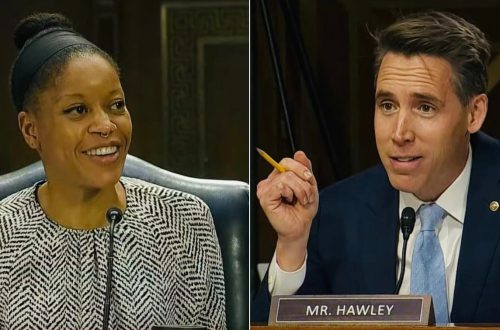When President Barack Obama was still a Senator, he opposed President Bush’s nomination of Samuel Alito to the Supreme Court. In a speech on the Senate floor, Senator Obama explained why:
There are some who believe that the President, having won the election, should have the complete authority to appoint his nominee, and the Senate should only examine whether or not the Justice is intellectually capable and an all-around nice guy. That once you get beyond intellect and personal character, there should be no further question whether the judge should be confirmed.
I disagree with this view. I believe firmly that the Constitution calls for the Senate to advise and consent. I believe that it calls for meaningful advice and consent that includes an examination of a judge’s philosophy, ideology, and record.
Senator Obama voted against President Bush’s nominee not because Alito was unqualified but because Obama did not agree with his judicial philosophy.
This was not an abuse of power. Article II of the U.S. Constitution gives the President the power to nominate judges and the Senate power to confirm or not confirm them.
The President… shall nominate, and by and with the advice and consent of the Senate, shall appoint ambassadors, other public ministers and consuls, judges of the Supreme Court, and all other officers of the United States.
(HT: Scott Klusendorff)




14 Comments
Roy Fuller
Dr. Burk, do you believe that the Senate is fulfilling its duty of “advise and consent” – by announcing, prior to the introduction of a nominee, that there will be no hearings and no vote on any nominee by this President?
Denny Burk
Yes
Bill Hickman
Denny – By citing the Alito example, you’re defeating your own “no hearings, no votes” argument. Obama opposed Alito’s confirmation after a full hearing. Obama’s nominee should get the same consideration.
Denny Burk
No inconsistency. I did not argue either for or against hearings. I argued that Article II of the Constitution gives the power to confirm or not. Whether they choose to hold hearings or a vote is a political question, not a Constitutional one.
Bill Hickman
Well you created the opposite impression when in your other post you clipped the *very part* of Hugh Hewitt’s article that says “I would say very simply, no hearings, no votes.”
Denny Burk
We may be talking passed one another here. I meant that in my original post, I didn’t take a position. I was simply pointing out that the Constitution empowers the Senate to confirm or not confirm judicial nominations.
As a political question, it is my view that there should be “no hearings / no votes.”
Roy Fuller
Here is an interesting question to ponder: What do you believe Justice Scalia would advocate, given his originalist approach to the Constitution? I realize that we cannot know the answer to this question, but I raise it because I find it odd that persons who call for not reading into the Constitution can argue that the Senate can fulfill its role by doing nothing. Listen, I realize the politics of this situation, and as someone who leans Democrat, I don’t want persons on the court whose judicial philosophy and political positions I disagree with. I absolutely believe the the Republican-led Senate has the right to vote down someone, but I believe they should vote. So, I am struggling with these calls to do nothing in the case of a presidential nomination. Would seem to set a bad precedent, not just for other SCOTUS nominees, but all positions which have to be confirmed, and, for that matter, international treaties. And to further play this out: if we were to have a President Hillary Clinton or Bernie Sanders, what is the Republican strategy at that point – no hearing and no votes? As they say, elections have consequences.
Denny Burk
Article II of the U.S. Constitution doesn’t require the Senate to have hearings or even to hold a vote. Both are completely within the discretion of the Senate. So it simply is an error to think that it is a Constitutional “duty” for the Senate to have a vote. It is not.
Roy Fuller
I spoke of the Senate fulfilling its duty. You are correct in that the Constitution does not specify how to do that, hearing and votes are not mentioned, “advise and consent” is mentioned, and I believe that to take no action on a SCOTUS nominee does fulfill the Senate’s responsibility. And I gather that you believe the Senate should not confirm anyone who does not conform to Scalia’s extremist interpretation – which means no confirmations in the foreseeable future, undermining one of the branches of government.
Roy Fuller
Intended to say “to take no action on a SCOTUS nominee does NOT fulfill the Senate’s responsibility.”
Gus Nelson
It is an exercise in futility and pure political theatrics for the President to nominate someone who he knows the Senate will not confirm, only to then bang the drumbeat that the Republicans are therefore being “obstructionist.” The Senate is completely within its purview to reject a president’s nominee (and has done so many times in the past). This is the price President Obama is paying for his politics thus far – had he played his cards better he could still have a Democratic majority in the Senate and his nominee would sail through. So the “advice” the Senate is giving the President is “don’t bother.” He will nonetheless offer up a nominee then whine and complain bitterly about how badly he and his nominee are being treated by the nasty Republicans who “wouldn’t even give him a chance.”
Christiane Smith
‘Advise and Consent’ is an appropriate Senate vetting of a nominee for the highest court in our land . . . the nation expects for a President to nominate to the best of his ability, and for the Senate to perform it’s duty responsibly. And, yes, ‘philosophy, ideology, and record’ are appropriate categories to be investigated . . . and when this work is well done of our Senators, then the country is being served honorably.
I think also that the initial words spoken by some in politics were unhelpful. That may have been a ‘reaction’ to very upsetting news, but those words cannot be unspoken, and now the nation is alerted to pay close attention to what will unfold.
We live in interesting times. We need wise and honorable leadership. Most Americans will agree with this need, as the absence of wisdom and of honor is not worthy of so great a nation.
Don Johnson
I agree that the Senate can reject a nominee for any reason or no reason.
Instead of saying that they would reject ANY nominee, I think they should have said they are waiting for Obama to ask the Senate (as a voting chamber) for advice.
Gus Nelson
Don: I like how you put it. That said, I don’t think it matters what the Republican controlled Senate says or does. If it doesn’t accept an Obama appointee, it will be lambasted by the press and the Democrats, so it might have been simple pragmatism to “just say no” right away and get it over with.